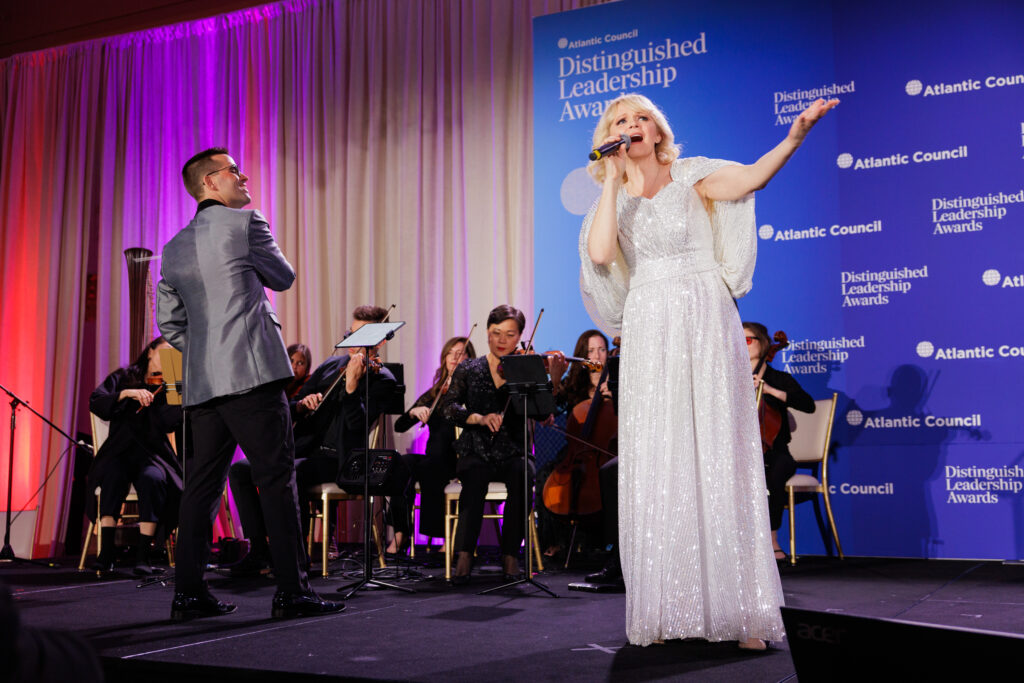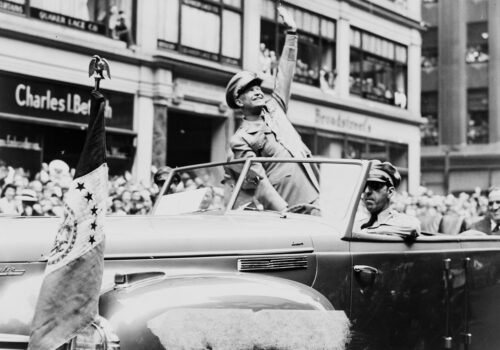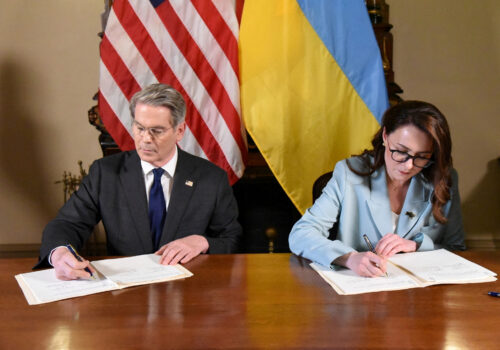“Tonight, we are gathered not only to celebrate global leadership, but to honor extraordinary courage,” said Atlantic Council President and CEO Frederick Kempe at the Distinguished Leadership Awards in Washington, DC, on Thursday. “The kind that changes the course of history and reminds us all of the true meaning of bravery and service.”
Before a crowd of high-level attendees from government, business, the military, civil society, and the media, the Atlantic Council honored six leaders who have shown such courage through their service, leadership, and activism.
Stephen Hadley, a former US national security advisor and an executive vice chair of the Atlantic Council’s Board of Directors, was honored for his decades of public service across three US administrations.
Croatian Prime Minister Andrej Plenković was recognized for his efforts to advance Croatia’s economic development and his role in advancing the country’s accession to the European Union.
General (ret.) John W. “Jay” Raymond was honored for his pioneering role as the first chief of space operations for the US Space Force.
Victor Pinchuk, a Ukrainian businessman and philanthropist who founded EastOne, YES, and the Victor Pinchuk Foundation, was awarded for his support for Ukrainian soldiers and civil society since Russia’s full-scale invasion.
Judy Collins, a Grammy Award-winning and Academy Award-nominated singer and songwriter, was honored for her work promoting mental health awareness, civil rights, and environmental conservation.
The final honorees of the evening were Ukrainian war heroes and veterans who have risked their lives to defend their country’s sovereignty and freedom from Russian aggression.
“Seldom has so much been at stake for the liberties and the collective interests of people and cultures and countries everywhere,” said Atlantic Council Chairman John F.W. Rogers. “Against this backdrop, the Atlantic Council continues its commitment to meet these challenges of the moment and to help chart a path forward.”
Below are more highlights from the ceremony.
Judy Collins: “Music is, I think, the heart of most things in life”
- Introducing Collins, Atlantic Council Executive Vice Chair Adrienne Arsht said that in addition to her decades-spanning career as a singer and songwriter, “her artistry extends far beyond the stage and the recording studio,” citing her mental health awareness and environmental advocacy.
- Arsht said that Collins was “an outstanding humanitarian” defined not only by her “unmistakable voice,” but also her “unwavering compassion.”
- “In this room,” Collins said, “there is so much energy, and so much intelligence, and so much vision. And I’m sure we can solve these things that are going on in the world.”
- “Music, is, I think the heart of most things in life,” said Collins. “We have work to do, we have celebrations to make, and music helps us to do it.”
- After accepting the Distinguished Artistic Leadership Award, she performed the Stephen Sondheim song “Send in the Clowns,” which was a Billboard-charting hit for Collins in 1975.
Stephen J. Hadley: “Don’t turn your back on those principles that gave us eighty years of peace and prosperity.”
- “When the United States does not lead, either nothing happens or bad things happen,” said Hadley in a discussion with Rogers on the United States’ role in the world after accepting the Distinguished Service Award. “And I think this is a lesson that’s been lost on the American people.”
- “If you want to really advance the peace, prosperity, safety, and security of the American people,” said Hadley, “you need a strategy. You need to define what you want, how you’re going to get there. Otherwise, you’re going to flounder.”
- Noting that there are many US government agencies and departments that work on foreign policy, Hadley emphasized the importance of getting them to coordinate and cooperate toward the same objectives. “Good process does not dictate good policy,” he said, “but good policy is harder to achieve without good process.”
- “You need to take the time to build a bipartisan support for foreign policy initiatives,” Hadley said, to ensure that they “last across administrations and so they can stay in place long enough to produce the results that they’re intended to produce.”
- Hadley called the debate over whether the United States should pursue its values or its interests abroad “a false choice.” Advancing US values, he said “makes a world that is more congenial to American interests and is more congenial to the prosperity, security, and safety of the American people.”
- Addressing policymakers who take a more transactional and less values-based view of US foreign policy interests, Hadley said: “Don’t turn your back on those principles that gave us eighty years of peace and prosperity. There’s a lot still relevant here today.”
- In a pre-recorded video message, former US Secretary of State Condoleezza Rice, who served with Hadley during the George W. Bush administration, praised Hadley for serving with a “steady hand” and a “complete commitment” to the United States’ role abroad, as well as for carrying out US policies with “principle and with values at the center of them.”
Andrej Plenković: “We remain committed to preserving the transatlantic bond”
- Plenković, receiving the Distinguished International Leadership Award, said his nine years in office have been “shaped by a growing number of global crises,” as “governing today is no longer a matter of routine decision-making—it is an ongoing exercise in resilience and crisis management.”
- Plenković described his government’s “vision” as making Croatia stand among the “most advanced, stable, and prosperous nations,” but noted that the country’s path to this goal “has not been easy.”
- Croatia began this journey “from the ashes of war and destruction” in the early 1990s, he said, but the country’s “determination was forged” in this difficult past.
- “Croatia, as a committed transatlantic ally, will continue to stand with America,” Plenković said. He told of influential Croats who made their mark in the United States, including Medal of Honor recipient Peter Tomich, winemaker Mike Grgich, oil explorer Anthony Lucas, sculptor Ivan Meštrović, and inventor Nikola Tesla.
- Together, he said, the United States and Croatia are “committed to preserving the transatlantic bond as the cornerstone of a free and democratic world.”
- “Anything less,” said Plenković, would “weaken both Europe and the United States and only embolden those who challenge our shared values. This truth holds in Ukraine today, as it did in Croatia in the ‘90s, and wherever freedom is under threat.”
- In his introductory remarks, former Colombian President Andrés Pastrana Arango praised Plenković for bringing “continuity, stability, and a clear strategic vision” to Croatia, citing the country’s recent accession to the Schengen Area and strong economic growth.
John W. Raymond: “To effectively operate in the space domain we must have global partners”
- In accepting the Distinguished Military Leadership Award, Raymond said that it was in recognition of “the nearly sixteen thousand civilian and military guardians” who volunteered to join the US Space Force after it was established in 2019, adding that because of their service “our nation and our allies are better postured to meet the incredibly complex strategic environment that we face.”
- “To effectively operate in the space domain, we must have global partners,” said Raymond, noting that the Space Force expanded Combined Space Operations to include Five Eyes members as well as other allies and partners and has strengthened its ties with NATO.
- The force has also partnered with the US commercial space industry, which Raymond said “provides us and our allies and partners great advantage.”
- Noting that US war plans “are all sized assuming we have access to space,” Raymond warned that given the threats being developed by US adversaries, “this is a flawed assumption. We no longer have the luxury of taking space for granted.”
- Amid these growing threats, Raymond said that space capabilities can enhance overall deterrence and that “if we can successfully deter conflict from beginning or extending into space, then we have a chance of deterring conflict from spilling over into other domains.” The space domain, he said, “represents our best hope.”
- Raymond was introduced by former House Armed Services Committee Chairman William “Mac” Thornberry, a major advocate for the Space Force’s establishment. Thornberry said Raymond’s early precedent-setting moves for the Space Force “set the new service on a path that grows more crucial and also more contested every moment.”
Victor Pinchuk: “Security guarantees are vital”
- Pinchuk said that on first learning he would be honored with the Distinguished Humanitarian Leadership Award, he thought to himself that “this is the wrong time for a Ukrainian businessman to get an award” given the continued suffering of the Ukrainian people during wartime.
- However, he concluded that “if I go to Washington, I can be useful,” as this would allow him to speak to a US audience about “Ukrainian heroes” fighting against Russia, “express our deep gratitude to the United States” for military assistance, and emphasize the importance of a security guarantee for a lasting peace in Ukraine.
- Pinchuk highlighted the bravery of two Ukrainian veterans in the audience. Dmytro Finashyn, he noted, lost his arm in combat but returned to service first as an intelligence officer and then as an adviser to the interior minister on veterans’ affairs. Liudmyla Meniuk, Pinchuk told the audience, joined the army at age fifty-two after her son was killed in the war, later becoming the first Ukrainian woman to lead an armored unit.
- Pinchuk said he was grateful to the United States for its support for Kyiv and thanked US President Donald Trump for recently authorizing a weapons sale to Ukraine. He called the US-Ukraine minerals deal “momentous,” adding that he called it the “Minerals for Peace Accord.”
- “Ukrainians understand, an end to the war now is possible only in a not perfect way,” he said, adding that no one would be completely satisfied with the peace settlement and that “some goals maybe will take many years to achieve.”
- However, Pinchuk emphasized that when Russian leaders speak of addressing the “root cause” of the war in negotiations, what they mean is “the existence of Ukraine” as a free and democratic country with the rule of law. “It is the ‘mistake’ of the existence of Ukraine that our enemy wants to ‘address,’ which means—remove, delete, annihilate.”
- “This is why security guarantees are vital,” said Pinchuk. “And nobody in the world can imagine such guarantees” without the participation of the United States, he said.
- “Victor is truly Ukraine’s renaissance man,” said David M. Rubenstein, co-founder and co-chairman of the Carlyle Group, while introducing Pinchuk. Rubenstein commended him for his philanthropic work helping Ukraine, which since Russia’s full-scale invasion has included the creation of programs that operate rehabilitation centers for wounded Ukrainian veterans and provide mental health services to returning soldiers.
Ukrainian war heroes and veterans
- Speaking on behalf of the delegation of nine Ukrainian soldiers and veterans being honored for their service, Daniel Salem thanked the United States for its “crucial support” for his country’s war effort.
- “The cancer—the second name for war—spreads beyond the Russian-Ukraine war,” Salem said. “It spreads all over the world.”
- “The people that you see in front of you are representative of a strong nation, like yours,” Salem told the audience. “An honorable nation, like yours. People with dreams, as you do have dreams. And we all know that in the way of achieving your dreams you must apply discipline, commitment, consistency. Because without commitment, you don’t know how to start, and without consistency we won’t know how to finish.”
- Ukraine, Salem said, had already proven “that we are the home of the brave.” With US help, he added, Ukraine will be able to say it is “the land of the free.”
Further reading
Thu, May 8, 2025
The lesson of VE Day 80 years later: Discard the ‘false choice’ between US values and interests
Inflection Points By Frederick Kempe
This epoch has shown the United States at its best. Yet clinging to the status quo isn’t a policy designed for the future.
Wed, Apr 30, 2025
Experts react: At last, the US and Ukraine signed a minerals deal. Here’s what to expect next.
New Atlanticist By
After months of wrangling, Washington and Kyiv quietly finalized a much-anticipated agreement on April 30. Atlantic Council experts dig into the details.
Thu, May 1, 2025
Cautious optimism in Kyiv as Ukraine reacts to landmark US minerals deal
UkraineAlert By Peter Dickinson
There was a sense of cautious optimism in Kyiv on Thursday morning as Ukrainians reacted to news that a long-awaited natural resources agreement with the United States had finally been signed, writes Peter Dickinson.



